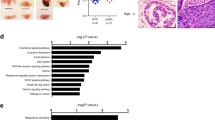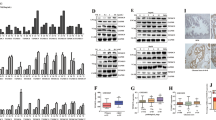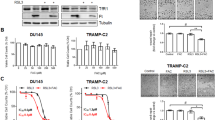Abstract
Background:
Emerging data suggest that obesity increases the risk of aggressive prostate cancer (PC), but the mechanisms underlying this relationship remain to be fully elucidated. Oxidative stress (OS) is a key process in the development and progression of PC. Adiponectin, an adipocyte-specific hormone, circulates at relatively high levels in healthy humans, but at reduced levels in obese subjects. Moreover, case–control studies also document lower levels of serum adiponectin in PC patients compared with healthy individuals.
Methods:
Human 22Rv1 and DU-145 PC cell lines were examined for the generation of OS and detoxification of reactive oxygen species after treatment with adiponectin. Normality was confirmed using the Shapiro–Wilk test and results were analyzed using a one-way analysis of variance.
Results:
We demonstrate that adiponectin increased cellular anti-oxidative defense mechanisms and inhibited OS in a significant and dose-dependent manner. We show that adiponectin treatment decreased the generation of superoxide anion in both cell lines, whereas the transcript levels of NADPH oxidase (NOX)2 and NOX4 increased. We also found indications of an overall anti-oxidative effect, as the total anti-oxidative potential, catalase activity and protein levels, and manganese superoxide dismutase protein levels increased significantly (P<0.05) in both cell lines after treatment with adiponectin.
Conclusion:
Lower levels of adiponectin in obese individuals may result in higher levels of prostatic OS, which may explain the clinical association between obesity, hypoadiponectinemia and PC.
This is a preview of subscription content, access via your institution
Access options
Subscribe to this journal
Receive 4 print issues and online access
$259.00 per year
only $64.75 per issue
Buy this article
- Purchase on Springer Link
- Instant access to full article PDF
Prices may be subject to local taxes which are calculated during checkout






Similar content being viewed by others
References
Andersson SO, Wolk A, Bergstrom R, Adami HO, Engholm G, Englund A et al. Body size and prostate cancer: a 20-year follow-up study among 135006 Swedish construction workers. J Natl Cancer Inst 1997; 89: 385–389.
Gong Z, Neuhouser ML, Goodman PJ, Albanes D, Chi C, Hsing AW et al. Obesity, diabetes, and risk of prostate cancer: results from the prostate cancer prevention trial. Cancer Epidemiol Biomarkers Prev 2006; 15: 1977–1983.
Gong Z, Agalliu I, Lin DW, Stanford JL, Kristal AR . Obesity is associated with increased risks of prostate cancer metastasis and death after initial cancer diagnosis in middle-aged men. Cancer 2007; 109: 1192–1202.
Rodriguez AR, Kapoor R, Pow-Sang JM, Rodriguez C, Freedland SJ, Deka A et al. Laparoscopic extraperitoneal radical prostatectomy in complex surgical cases. Body mass index, weight change, and risk of prostate cancer in the Cancer Prevention Study II Nutrition Cohort. J Urol 2007; 177: 1765–1770.
Buschemeyer III WC, Freedland SJ . Obesity and prostate cancer: epidemiology and clinical implications. Eur Urol 2007; 52: 331–343.
Hsieh K, Albertsen PC, Hsieh LJ, Carter HB, Landis PK, Tucker KL et al. Populations at high risk for prostate cancer. Association of energy intake with prostate cancer in a long-term aging study: Baltimore Longitudinal Study of Aging. Urol Clin North Am 2003; 30: 669–676.
Schuurman AG, van den Brandt PA, Dorant E, Brants HA, Goldbohm RA . Association of energy and fat intake with prostate carcinoma risk: results from The Netherlands Cohort Study. Cancer 1999; 86: 1019–1027.
Gavrila A, Chan JL, Yiannakouris N, Kontogianni M, Miller LC, Orlova C et al. Serum adiponectin levels are inversely associated with overall and central fat distribution but are not directly regulated by acute fasting or leptin administration in humans: cross-sectional and interventional studies. J Clin Endocrinol Metab 2003; 88: 4823–4831.
Trujillo ME, Scherer PE . Adipose tissue-derived factors: impact on health and disease. Endocr Rev 2006; 27: 762–778.
Goktas S, Yilmaz MI, Caglar K, Sonmez A, Kilic S, Bedir S . Prostate cancer and adiponectin. Urology 2005; 65: 1168–1172.
Michalakis K, Williams CJ, Mitsiades N, Blakeman J, Balafouta-Tselenis S, Giannopoulos A et al. Serum adiponectin concentrations and tissue expression of adiponectin receptors are reduced in patients with prostate cancer: a case control study. Cancer Epidemiol Biomarkers Prev 2007; 16: 308–313.
Mistry T, Digby JE, Desai KM, Randeva HS . Obesity and prostate cancer: a role for adipokines. Eur Urol 2007; 52: 46–53.
Freedland SJ, Sokoll LJ, Platz EA, Mangold LA, Bruzek DJ, Mohr P et al. Association between serum adiponectin, and pathological stage and grade in men undergoing radical prostatectomy. J Urol 2005; 174 (Part 1): 1266–1270.
Li H, Stampfer MJ, Mucci L, Rifai N, Qiu W, Kurth T et al. A 25-year prospective study of plasma adiponectin and leptin concentrations and prostate cancer risk and survival. Clin Chem 2010; 56: 34–43.
Bianchi-Frias D, Vakar-Lopez F, Coleman IM, Plymate SR, Reed MJ, Nelson PS . The effects of aging on the molecular and cellular composition of the prostate microenvironment. PLoS One 2010; 5: pii e12501.
De Marzo AM, Platz EA, Sutcliffe S, Xu J, Gronberg H, Drake CG et al. Inflammation in prostate carcinogenesis. Nat Rev Cancer 2007; 7: 256–269.
Pinthus JH, Bryskin I, Trachtenberg J, Lu JP, Singh G, Fridman E et al. Androgen induces adaptation to oxidative stress in prostate cancer: implications for treatment with radiation therapy. Neoplasia 2007; 9: 68–80.
Arsova-Sarafinovska Z, Eken A, Matevska N, Erdem O, Sayal A, Savaser A et al. Increased oxidative/nitrosative stress and decreased antioxidant enzyme activities in prostate cancer. Clin Biochem 2009; 42: 1228–1235.
Guichard C, Moreau R, Pessayre D, Epperson TK, Krause KH . NOX family NADPH oxidases in liver and in pancreatic islets: a role in the metabolic syndrome and diabetes? Biochem Soc Trans 2008; 36 (Part 5): 920–929.
Bonekamp NA, Volkl A, Fahimi HD, Schrader M . Reactive oxygen species and peroxisomes: struggling for balance. Biofactors 2009; 35: 346–355.
Goldstein BJ, Scalia R . Adiponectin: A novel adipokine linking adipocytes and vascular function. J Clin Endocrinol Metab 2004; 89: 2563–2568.
Luo Z, Saha AK, Xiang X, Ruderman NB . AMPK, the metabolic syndrome and cancer. Trends Pharmacol Sci 2005; 26: 69–76.
Zakikhani M, Dowling RJ, Sonenberg N, Pollak MN . The effects of adiponectin and metformin on prostate and colon neoplasia involve activation of AMP-activated protein kinase. Cancer Prev Res (Phila) 2008; 1: 369–375.
Kumar B, Koul S, Khandrika L, Meacham RB, Koul HK . Oxidative stress is inherent in prostate cancer cells and is required for aggressive phenotype. Cancer Res 2008; 68: 1777–1785.
Stone KR, Mickey DD, Wunderli H, Mickey GH, Paulson DF . Isolation of a human prostate carcinoma cell line (DU 145). Int J Cancer 1978; 21: 274.
Sramkoski RM, Pretlow II TG, Giaconia JM, Pretlow TP, Schwartz S, Sy MS et al. A new human prostate carcinoma cell line, 22Rv1. In Vitro Cell Dev Biol Anim 1999; 35: 403–409.
Choi HS, Kim JW, Cha YN, Kim C . A quantitative nitroblue tetrazolium assay for determining intracellular superoxide anion production in phagocytic cells. J Immunoassay Immunochem 2006; 27: 31–44.
Rook GA, Steele J, Umar S, Dockrell HM . A simple method for the solubilisation of reduced NBT, and its use as a colorimetric assay for activation of human macrophages by gamma-interferon. J Immunol Methods 1985; 82: 161–167.
Vaquero EC, Edderkaoui M, Pandol SJ, Gukovsky I, Gukovskaya AS . Reactive oxygen species produced by NAD(P)H oxidase inhibit apoptosis in pancreatic cancer cells. J Biol Chem 2004; 279: 34643–34654.
Lin H, Lu JP, Laflamme P, Qiao S, Shayegan B, Bryskin I et al. Inter-related in vitro effects of androgens, fatty acids and oxidative stress in prostate cancer: a mechanistic model supporting prevention strategies. Int J Oncol 2009; 37: 761–766.
Yamauchi T, Kamon J, Ito Y, Tsuchida A, Yokomizo T, Kita S et al. Cloning of adiponectin receptors that mediate antidiabetic metabolic effects. Nature 2003; 423: 762–769.
Kadowaki T, Yamauchi T . Adiponectin and adiponectin receptors. Endocr Rev 2005; 26: 439–451.
Rivera J, Sobey CG, Walduck AK, Drummond GR . Nox isoforms in vascular pathophysiology: insights from transgenic and knockout mouse models. Redox Rep 2010; 15: 50–63.
De Marzo AM, DeWeese TL, Platz EA, Meeker AK, Nakayama M, Epstein JI et al. Pathological and molecular mechanisms of prostate carcinogenesis: implications for diagnosis, detection, prevention, and treatment. J Cell Biochem 2004; 91: 459–477.
Khandrika L, Kumar B, Koul S, Maroni P, Koul HK . Oxidative stress in prostate cancer. Cancer Lett 2009; 282: 125–136.
Lee WH, Morton RA, Epstein JI, Brooks JD, Campbell PA, Bova GS et al. Cytidine methylation of regulatory sequences near the pi-class glutathione S-transferase gene accompanies human prostatic carcinogenesis. Proc Natl Acad Sci USA 1994; 91: 11733–11737.
Shetty S, Kusminski CM, Scherer PE . Adiponectin in health and disease: evaluation of adiponectin-targeted drug development strategies. Trends Pharmacol Sci 2009; 30: 234–239.
Acknowledgements
This study was funded by grants to JHP by the Juravinski Cancer Center Foundation and the Prostate Cancer Foundation of Canada.
Author information
Authors and Affiliations
Corresponding author
Ethics declarations
Competing interests
The authors declare no conflict of interest.
Rights and permissions
About this article
Cite this article
Lu, JP., Hou, Z., Duivenvoorden, W. et al. Adiponectin inhibits oxidative stress in human prostate carcinoma cells. Prostate Cancer Prostatic Dis 15, 28–35 (2012). https://doi.org/10.1038/pcan.2011.53
Received:
Revised:
Accepted:
Published:
Issue Date:
DOI: https://doi.org/10.1038/pcan.2011.53
Keywords
This article is cited by
-
Adiponectin Modulates DCA-Induced Inflammation via the ROS/NF-Kappa B Signaling Pathway in Esophageal Adenocarcinoma Cells
Digestive Diseases and Sciences (2014)
-
Underexpression of tumour suppressor LKB1 in clear cell renal cell carcinoma is common and confers growth advantage in vitro and in vivo
British Journal of Cancer (2013)
-
Oxidative stress in prostate cancer: changing research concepts towards a novel paradigm for prevention and therapeutics
Prostate Cancer and Prostatic Diseases (2013)
-
Genetic analysis of ADIPOQ variants and gastric cancer risk: a hospital-based case–control study in China
Medical Oncology (2013)



